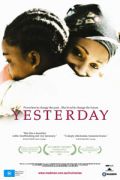
Directed by
Darrell James Roodt
102 minutes
Rated M
Reviewed by
Sharon Hurst

Yesterday
Synopsis: In a remote village in Zululand, South Africa, Yesterday (Leleti Khumalo) lives with her 7-year old daughter Beauty (Lihle Mvelase), while her husband John (Kenneth Kambule) works in the mines in Johannesburg. Suffering a nagging cough she walks miles to try to see a doctor. When eventually she gets a consultation, the devastating news is that she has HIV. Her only wish is to live long enough to see her beloved daughter start school.From the opening moments of this breathtakingly beautiful film, you know you're going to see something special. The opening shots linger upon a harsh but striking landscape, bone dry, and framed by majestic mountain ranges. A mother and daughter walk along a dusty road and en route meet two well dressed women who say they are teachers who have been walking for two years looking for a village in which to utilise their skills. Yesterday directs the women to her village, Rooihoek. After two hours of walking Yesterday arrives at a clinic only to be told the doctor is too busy to see anyone in the queue beyond a certain point. After her patient waiting she resignedly walks home.
The depiction here of South African women's daily lives is heartbreaking, as they pump water from the well, wash their clothes upon a rock and eke out a meagre living hoeing the dusty fields to sow a handful of seeds. And yet the quiet acceptance of their lot is staggeringly at odds with the attitudes of most people in Western societies. This makes it even more tragic that these simple hardworking women are doubly stricken by the ghastly disease brought home to them by their husbands.
Writer/director Darrell James Roodt wanted maximum authenticity for his film and thus it is the first commercial release to be made in the Zulu language. He also wanted the incredible contrast of the harsh realities of life and illness among this amazingly beautiful landscape.
Despite having a well-developed health infrastructure compared to other African nations, South Africa has more HIV-positive people than any other country in the world. Every week 56,000 Africans are dying with only one doctor for every 18,000 people. These are the dire facts, but the film remains a masterpiece of understatement. It builds quietly and gathers emotional momentum in a way that no diatribe or didactic piece on AIDS/HIV could ever achieve. The scripting cleverly and quietly shows the general ignorance among the people which has helped the spread of the pandemic, and the shame and fear which hinders a solution.
The exquisite Leleti Khumalo has such a still and peaceful presence and the compassion that she is capable of, despite her own condition, is an inspiration. The total love for her small daughter is wrenching, but nowhere does the director resort to emotional manipulation. Often the simplest of scenes or shots, such as the peeling of an orange, or mother and daughter walking along a ridge carrying timber, say more than any words could do. On the other hand their few interactions with men in the film unfortunately speak volumes for the role the latter play in oppressing and harming their women folk.
A haunting and distinctively African soundtrack rounds off this wonderful film which, although dealing with a very depressing topic, is ultimately a story of hope, courage and compassion.

Want more about this film?


Want something different?




